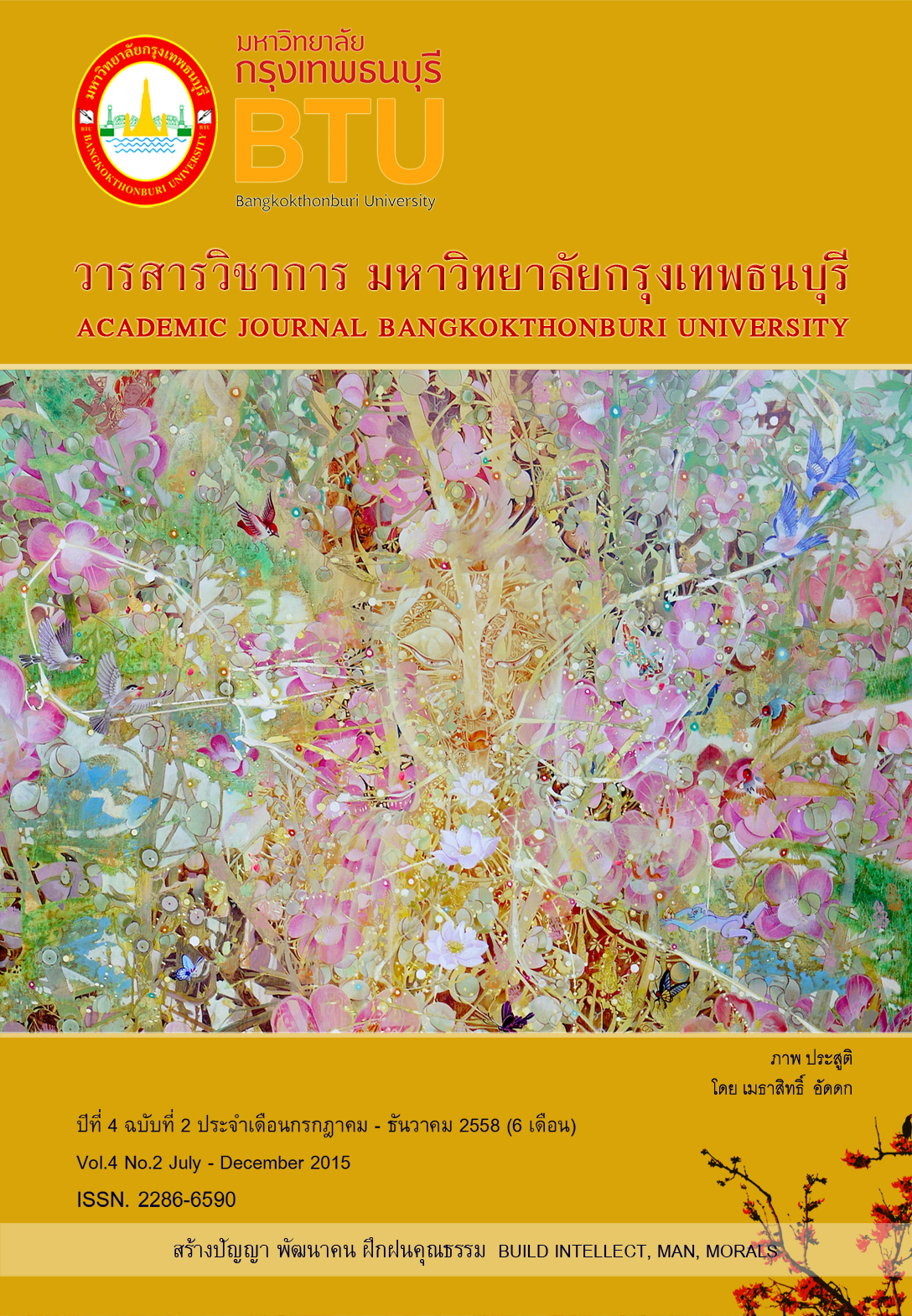อิทธิพลของภาวะผู้นำการเปลี่ยนแปลงและองค์การแห่งการเรียนรู้ที่ส่งผลต่อประสิทธิผลโรงเรียนมัธยมศึกษาในเขตจังหวัดภาคเหนือตอนล่าง ของประเทศไทย
Main Article Content
Abstract
บทคัดย่อ
การศึกษาครั้งนี้มีวัตถุประสงค์ 1) เพื่อศึกษาระดับภาวะผู้นำการเปลี่ยนแปลง องค์การแห่งการเรียนรู้และประสิทธิผลโรงเรียนมัธยมศึกษาในเขตจังหวัดภาคเหนือตอนล่างของประเทศไทย 2) เพื่อศึกษาความสัมพันธ์ระหว่างภาวะผู้นำการเปลี่ยนแปลง องค์การแห่งการเรียนรู้และประสิทธิผลโรงเรียนมัธยมศึกษาในเขตจังหวัดภาคเหนือตอนล่างของประเทศไทย และ 3) เพื่อศึกษาอิทธิพลของภาวะผู้นำการเปลี่ยนแปลงและองค์การแห่งการเรียนรู้ที่มีต่อประสิทธิผลโรงเรียนมัธยมศึกษาในเขตจังหวัดภาคเหนือตอนล่างของประเทศไทย ประชากรคือ ข้าราชการครู โรงเรียนมัธยมศึกษาสังกัดสำนักงานคณะกรรมการการศึกษาขั้นพื้นฐานในเขตจังหวัดภาคเหนือตอนล่างของประเทศไทย จำนวน 10,650 คน จาก 265 โรงเรียน กลุ่มตัวอย่างที่ตอบแบบสอบถามในการวิจัยในครั้งนี้ ได้แก่ ผู้อำนวยการโรงเรียน รองผู้อำนวยการโรงเรียนและตัวแทนครูผู้สอนระดับชั้นมัธยมศึกษาปีที่ 1-6 ของโรงเรียนมัธยมศึกษา สังกัดสำนักงานคณะกรรมการการศึกษาขั้นพื้นฐานในเขตภาคเหนือตอนล่างของประเทศไทย จำนวน 1,624 คน จาก 203 โรงเรียน โดยใช้วิธีการสุ่มแบบกลุ่ม (Cluster random sampling) ใช้โรงเรียนเป็นหน่วยในการวิเคราะห์ สถิติที่ใช้ในการวิเคราะห์ข้อมูลได้แก่ ค่าเฉลี่ย ส่วนเบี่ยงเบนมาตรฐาน ค่าสัมประสิทธิ์สหสัมพันธ์ของ Pearson (r) ค่าสัมประสิทธิ์สหสัมพันธ์แบบ Phi (ɸ) และค่าดัชนีความเหมาะสม (Fit Indices)
ผลการศึกษาพบว่า: 1) ระดับภาวะผู้นำการเปลี่ยนแปลง องค์การแห่งการเรียนรู้และประสิทธิผลโรงเรียนมัธยมศึกษาในเขตจังหวัดภาคเหนือตอนล่างของประเทศไทย มีค่าเฉลี่ยอยู่ในระดับมาก 2) ประสิทธิผลโรงเรียนและภาวะผู้นำการเปลี่ยนแปลงมีความสัมพันธ์เชิงบวกต่อกันในระดับสูงมากอย่างมีนัยสำคัญทางสถิติที่ระดับ .01 (ɸ=0.805, p< .01) ประสิทธิผลโรงเรียนและองค์การแห่งการเรียนรู้มีความสัมพันธ์เชิงบวกต่อกันในระดับสูงมากอย่างมีนัยสำคัญทางสถิติที่ระดับ .01 (ɸ=0.746, p< .01) และองค์การแห่งการเรียนรู้และภาวะผู้นำการเปลี่ยนแปลงมีความสัมพันธ์เชิงบวกต่อกันในระดับสูงมากอย่างมีนัยสำคัญทางสถิติที่ระดับ .01 (ɸ=0.724, p< .01) และ 3) ภาวะผู้นำการเปลี่ยนแปลงมีอิทธิพลต่อประสิทธิผลโรงเรียนในระดับสูงอย่างมีนัยสำคัญทางสถิติที่ระดับ .01 (g=0.555, p< .01) และองค์การแห่งการเรียนรู้มีอิทธิพลต่อประสิทธิผลโรงเรียนในระดับต่ำอย่างมีนัยสำคัญทางสถิติที่ระดับ .01 (g=0.334, p< .01) และภาวะผู้นำการเปลี่ยนแปลงกับองค์การแห่งการเรียนรู้สามารถร่วมกันทำนายประสิทธิผลโรงเรียนในระดับสูงมาก ได้ร้อยละ 70. 40 (R2=0.704)
Abstract
The objectives of this study are: 1) to study the levels of transformational leadership, learning organization and effectiveness of secondary schools in lower northern Thailand, 2) to study the relation of transformational leadership, learning organization and school effectiveness of secondary schools in southern north of Thailand, and 3) to study the influence of transformational leadership, learning organization and school effectiveness of secondary schools in southern north of Thailand. The populations are 10,650 teachers from 265 secondary schools in southern north of Thailand. The samples are 1,624 teachers from 203 secondary schools in southern north of Thailand from cluster random sampling. Units of analysis are schools. The statistics are means, standard deviations, Pearson’s correlation coefficient s (r) Phi coefficients (ɸ) and fit indices.
The research results have indicated that: 1) The average levels of transformational leadership, learning organization and school effectiveness of secondary schools in southern north of Thailand have been at a high level. 2) The correlation between school effectiveness and transformational leadership has been statistically significant positive at a very high level. (ɸ=0.805, p< .01) The correlation between school effectiveness and learning organization has been statistically significant positive at a very high level. (ɸ=0.746, p< .01) And the correlation between learning organization and transformational leadership has been statistically significant positive at a very high level. (ɸ=0.724, p< .01) 3) Transformational leadership has had statistically significant positive influences at a high level on school effectiveness of secondary schools in southern north of Thailand. (g=0.555, p< .01) Learning organization has had statistically significant positive influences at a low level on school effectiveness of secondary schools in southern north of Thailand. (g=0.334, p< .01) Transformational leadership and learning organization can explain and predict school effectiveness of secondary schools in southern north of Thailand at 70.40% (R2=0.704).


